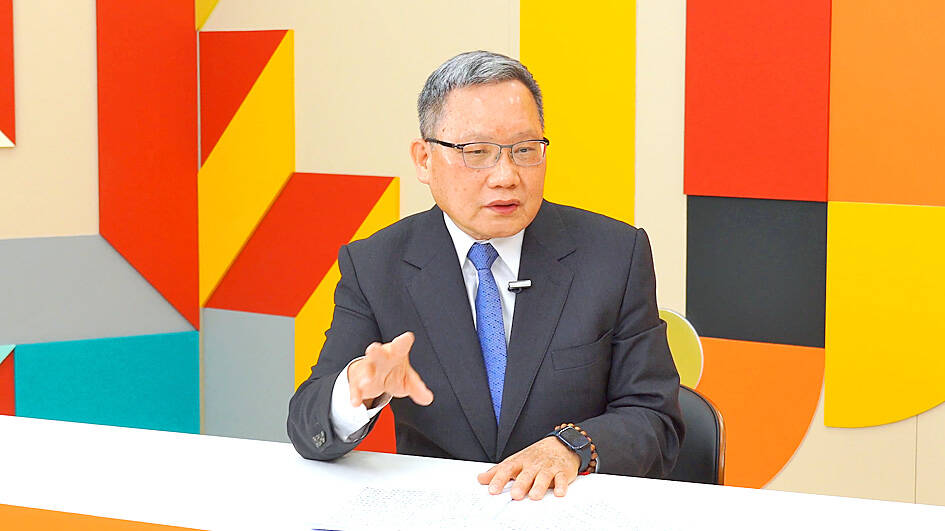Taiwan could benefit from the reorganization of global supply chains due to its democratic government, Taiwan Academy of Banking and Finance president Su Jain-rong (蘇建榮) said.
Wu made the remarks in an interview with the Chinese-
language Liberty Times (the sister paper of the Taipei Times) that was posted online yesterday.

Photo: Chen Yu-jui, Taipei Times
Citing Academia Sinica member Cyrus Chu’s (朱敬一) book Ultimate Economic Conflict between China and Democratic Countries: An Institutional Analysis (價值戰爭:極權中國與民主陣營的終極經濟衝突), Su said that the global supply chain is, by and large, being restructured along the lines of the democratic and autocratic camps.
Following the US-China trade war and COVID-19 pandemic, many companies have pulled out of China and relocated supply chains to other countries, he said.
The restructuring effort, headed by the US, does not imply desinicization, he said, adding that it aims to promote “ally-shoring,” the relocation of manufacturing plants from China to other countries — mainly democratic and free ones.
Su cited the US-Taiwan Initiative on 21st Century Trade bill signed by US President Joe Biden in August last year as an example of “ally-shoring,” saying that Taiwanese businesses sending products to the US, of which manufacturing plants were previously based in China, have relocated these plants to Mexico under the restructured supply chain.
Taiwan’s small and medium-sized enterprises (SMEs) provide greater vitality and flexibility in investing compared with larger corporations, he said, adding that these SMEs could play an essential role in the global supply chain.
Countries in the Americas and Europe had hoped that China would begin to dial back authoritarian rule after an improvement of its economy following its inclusion in the WTO in 2001, but Beijing ended up “stealing” democratic countries of their intellectual properties and other technologies after becoming an economic powerhouse, Su said.
With Chinese President Xi Jinping (習近平) adopting a heavy-handed political approach, foreign companies are hesitant to continue investing in China, resulting in a shrinking production sector, reduced jobs and lower consumption, Su said.
China’s public and private-sector debt has reached 200 percent of its GDP over the past few years.
Local government debt is primarily due to real-estate bubbles and the inability to repay its debts has affected China’s overall financial system, Su said.
The People’s Bank of China is making a large amount of funds available in hopes that financial institutions would have sufficient capital on hand and avoid potential financial storms, he said.
Information opacity in China is another concern, as the nation’s issues could be severe and catch its neighbors off guard, he added.

‘DENIAL DEFENSE’: The US would increase its military presence with uncrewed ships, and submarines, while boosting defense in the Indo-Pacific, a Pete Hegseth memo said The US is reorienting its military strategy to focus primarily on deterring a potential Chinese invasion of Taiwan, a memo signed by US Secretary of Defense Pete Hegseth showed. The memo also called on Taiwan to increase its defense spending. The document, known as the “Interim National Defense Strategic Guidance,” was distributed this month and detailed the national defense plans of US President Donald Trump’s administration, an article in the Washington Post said on Saturday. It outlines how the US can prepare for a potential war with China and defend itself from threats in the “near abroad,” including Greenland and the Panama

A wild live dugong was found in Taiwan for the first time in 88 years, after it was accidentally caught by a fisher’s net on Tuesday in Yilan County’s Fenniaolin (粉鳥林). This is the first sighting of the species in Taiwan since 1937, having already been considered “extinct” in the country and considered as “vulnerable” by the International Union for Conservation of Nature. A fisher surnamed Chen (陳) went to Fenniaolin to collect the fish in his netting, but instead caught a 3m long, 500kg dugong. The fisher released the animal back into the wild, not realizing it was an endangered species at

The Chinese Nationalist Party (KMT) is maintaining close ties with Beijing, the Democratic Progressive Party (DPP) said yesterday, hours after a new round of Chinese military drills in the Taiwan Strait began. Political parties in a democracy have a responsibility to be loyal to the nation and defend its sovereignty, DPP spokesman Justin Wu (吳崢) told a news conference in Taipei. His comments came hours after Beijing announced via Chinese state media that the Chinese People’s Liberation Army’s Eastern Theater Command was holding large-scale drills simulating a multi-pronged attack on Taiwan. Contrary to the KMT’s claims that it is staunchly anti-communist, KMT Deputy

The High Prosecutors’ Office yesterday withdrew an appeal against the acquittal of a former bank manager 22 years after his death, marking Taiwan’s first instance of prosecutors rendering posthumous justice to a wrongfully convicted defendant. Chu Ching-en (諸慶恩) — formerly a manager at the Taipei branch of BNP Paribas — was in 1999 accused by Weng Mao-chung (翁茂鍾), then-president of Chia Her Industrial Co, of forging a request for a fixed deposit of US$10 million by I-Hwa Industrial Co, a subsidiary of Chia Her, which was used as collateral. Chu was ruled not guilty in the first trial, but was found guilty